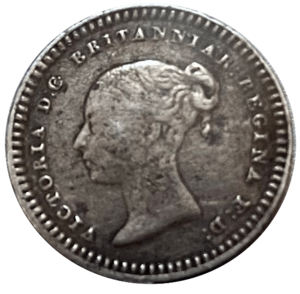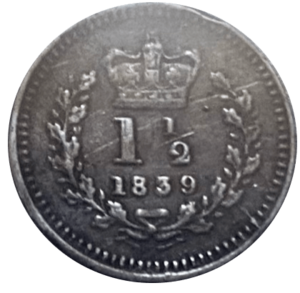Three halfpence (British coin) facts for kids
| United Kingdom | |
| Value | 112d sterling |
|---|---|
| Mass | 0.71 g |
| Diameter | (1834-1837) 12.3 mm (1837-1870) 12 mm |
| Edge | plain |
| Composition | 92.5% Ag |
| Years of minting | 1834-1843, 1860, 1862, 1870 |
| Obverse | |
 |
|
| Design | Profile of the monarch (Victoria shown) |
| Designer | William Wyon |
| Design date | 1837 |
| Reverse | |
 |
|
| Design | Crown and wreath |
| Design date | 1834 |
The three halfpence coin was a small silver coin from the United Kingdom. It was worth one and a half pennies. This coin was not used much in Britain itself. Instead, it was made mainly for use in British colonies. These colonies included places like Ceylon (now Sri Lanka) and the West Indies. The coin was made in several years between 1834 and 1870.
Contents
What Was the Three Halfpence Coin?
This coin was a special type of money. It was part of the British money system, even though it was used far away. This is because the colonies used British money rules. They did not have their own separate money systems. The three halfpence coin was worth a very small amount. It was 1160 of a pound. It was also 18 of a shilling.
How Big Was This Coin?
The three halfpence coin was quite small. It was made of silver. Each coin weighed about 0.7 grams. This is like a very light feather! The coin was also about 12 millimeters across. That's about the size of a small button.
What Did the Coin Look Like?
The coin had two main sides. One side showed the value and date. The other side showed the king or queen.
- The Back (Reverse Side): This side always looked the same. It showed the number "112". This number was under a crown. Below the crown and number was the year the coin was made. All of this was inside a wreath design. A wreath is like a circle of leaves.
- The Front (Obverse Side): This side changed depending on who was ruling.
- King William IV (1834-1837): Coins from these years showed King William IV. His face looked to the right. Around his picture, it said "GULIELMUS IIII D G BRITANNIAR REX F D". This is Latin. It means "William IV, by the Grace of God, King of the Britains, Defender of the Faith."
- Queen Victoria (1837-1870): Later coins showed Queen Victoria. Her face looked to the left. Around her picture, it said "VICTORIA D G BRITANNIAR REGINA F D". This Latin means "Victoria, by the Grace of God, Queen of the Britains, Defender of the Faith."
Where Was the Coin Used?
The three halfpence coin was mostly used in British colonies. It was very popular in Jamaica. In Jamaica, people had a special nickname for it. They called it a quatty. This was because it was worth one quarter of a sixpence coin.
 | George Robert Carruthers |
 | Patricia Bath |
 | Jan Ernst Matzeliger |
 | Alexander Miles |

